

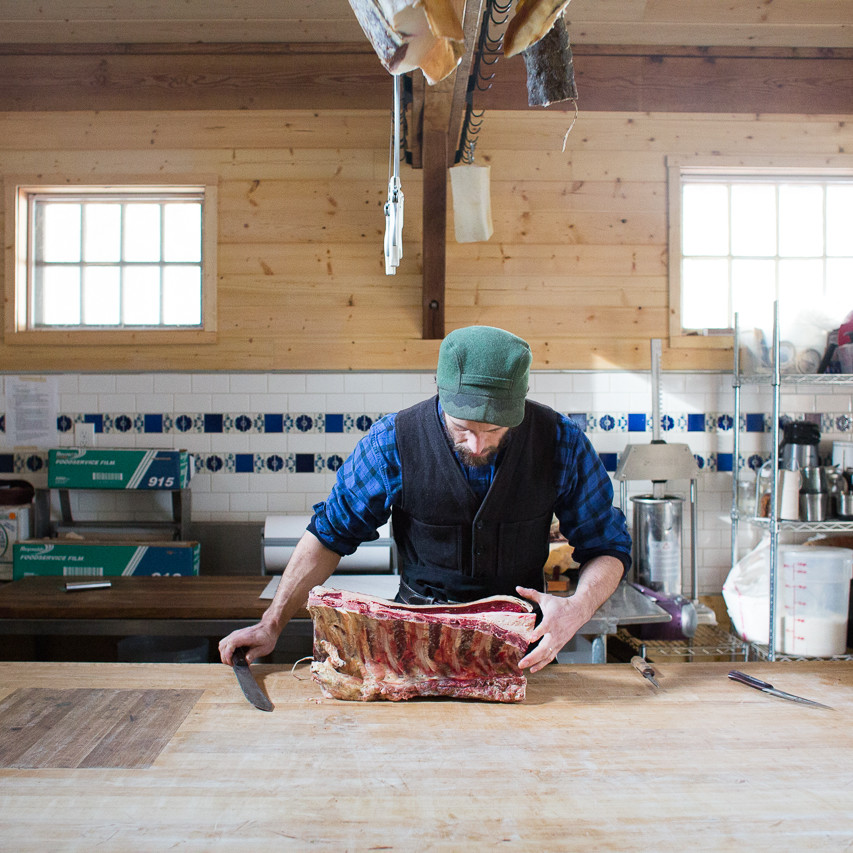
Tradition: Originally, a surrender.
Farmstead Meatsmith proudly claims methods seeped in tradition. But what does this mean? We believe the most beautiful goods and services are the results of extra labor, commitment to humble tools and resistance to the compromises of modernity. In this way, Farmstead Meatsmith has indeed surrendered to harvesting animals with patience.
The result is a fall into tradition where none of the animal is disposable, “trim” is exalted to the central place on the table and “off-cuts” become one thing you want on your plate. We are driven by principle and guided by time-honored practices, and delighted to discover that it tastes better that way.
For instance…
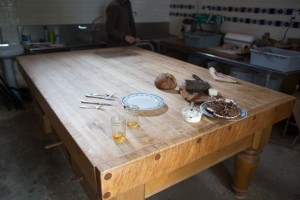 Our philosophy is that humane methods of animal processing not only ensure use of the whole animal but also grant the most delicious provender for your home table. With us ethics, efficiency and pleasure curiously unite in what we call a peasant economy.
Our philosophy is that humane methods of animal processing not only ensure use of the whole animal but also grant the most delicious provender for your home table. With us ethics, efficiency and pleasure curiously unite in what we call a peasant economy.
Our focus from the kill to freezer-wrap is the culinary end of every cut.
We can reduce waste to nothing and always invite the harvest to occur with the farmer’s participation.
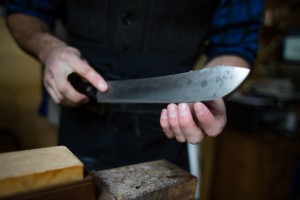 We use antique cutlery exclusively and do our own sharpening. Far from being an expendable tool, a scary sharp blade is the workhorse that makes proper cookery and curing possible.
We use antique cutlery exclusively and do our own sharpening. Far from being an expendable tool, a scary sharp blade is the workhorse that makes proper cookery and curing possible.
Meat saws on the other hand expose meat to quicker oxidization and subsequent spoilage. Electric saws never shred our customers’ meat.
![]() We use simple, manual tools essential to the results we seek.
We use simple, manual tools essential to the results we seek.
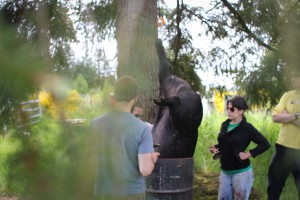 We hang pigs from trees, high enough to dunk into our scalding unit so we can scrape hair off properly. We prefer this to skinning the animal, which wastes and disgraces the precious back fat, deprives your roasts of crackling and your cool beer of pork rinds.
We hang pigs from trees, high enough to dunk into our scalding unit so we can scrape hair off properly. We prefer this to skinning the animal, which wastes and disgraces the precious back fat, deprives your roasts of crackling and your cool beer of pork rinds.
We make brandy chicken liver pâté after chicken harvests because it is the most delicious thing to do. We make blood sausage for larger animal slaughter day lunches because we are grateful and hungry.
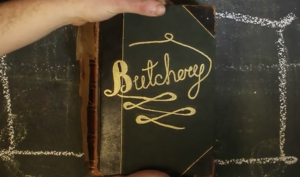
We use traditional sources of knowledge to guide our practices and love sharing what we’ve learned.
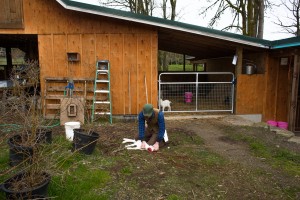 Informed by ancient methods, we harvest sheep without stunning. We’ve researched that these animals register more pain and longer consciousness when shot before being bled out. It is no wonder that tradition tells us a lamb is silent before the slaughter.
Informed by ancient methods, we harvest sheep without stunning. We’ve researched that these animals register more pain and longer consciousness when shot before being bled out. It is no wonder that tradition tells us a lamb is silent before the slaughter.
The entire narrative from field to plate is remarkably intelligible: Only the tapestry taken as a whole discloses the entire pattern.
A letter from our Meatsmith
Not a harvest goes by that does not challenge my philosophy. Leaving oneself open to be shaped by the harvest, suspending even just one preconceived foodism, opens the floodgates to a complete existential crisis.
In the silence before the crack of the rifle, it begins. The gravity of your deed weighs heavily on the rest of the harvest. Suddenly, processing isn’t enough. Death, life, beauty, thrift, extravagance, pain, delight, the sublime, the solemn and the gleeful ride on every stroke of the knife.
This is the food that transcends our likes and dislikes. It shaped them at the outset. It is true that we have since marred them with lesser fare, but we cannot now withdraw lethargically before quick-eyed abundance pulls us back. She beckons us to the table not just as servants, but as honored guests, our hearts wounded with joy as we sit and eat.
Having patiently born this ridiculous effusion of plagiarism, it is my pleasure to relieve you and invite you into the existential crises of your servant,
Brandon
